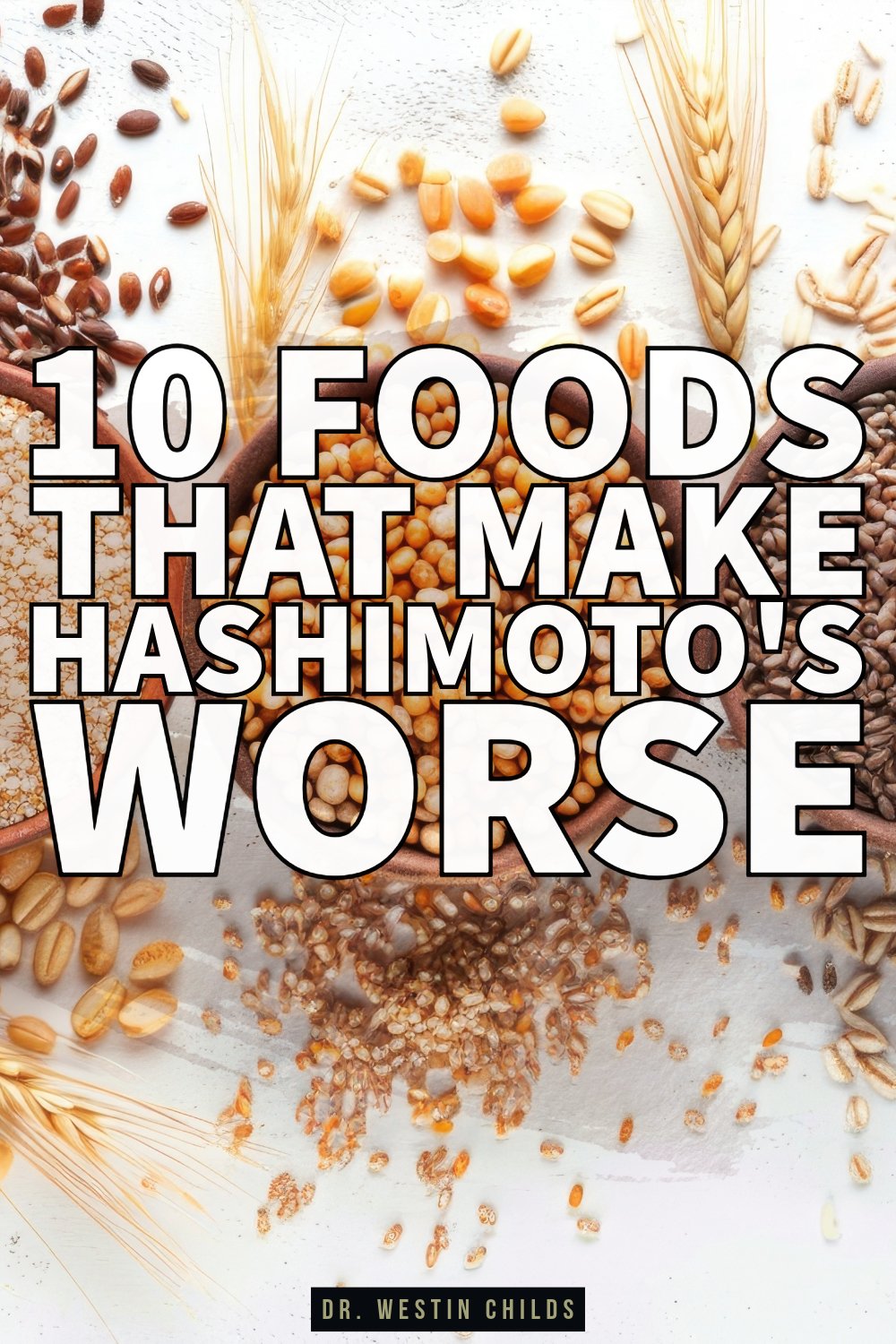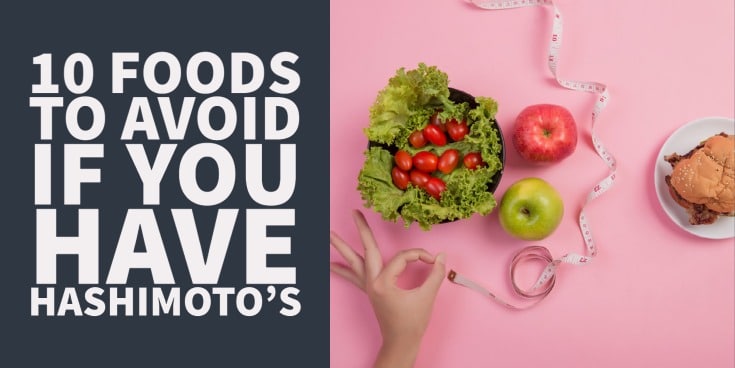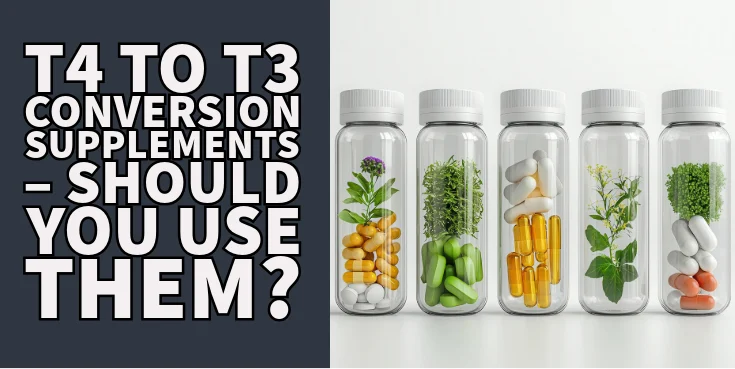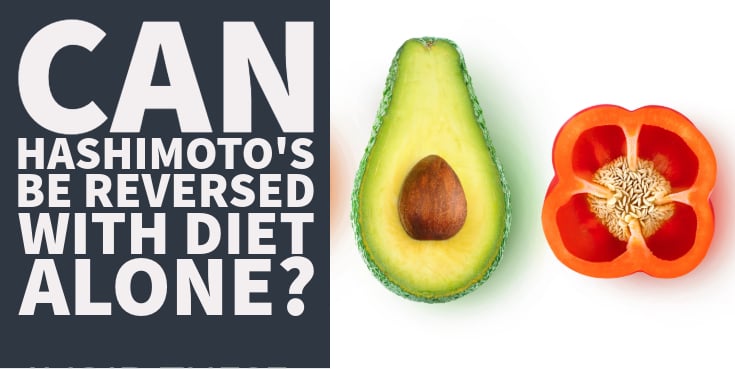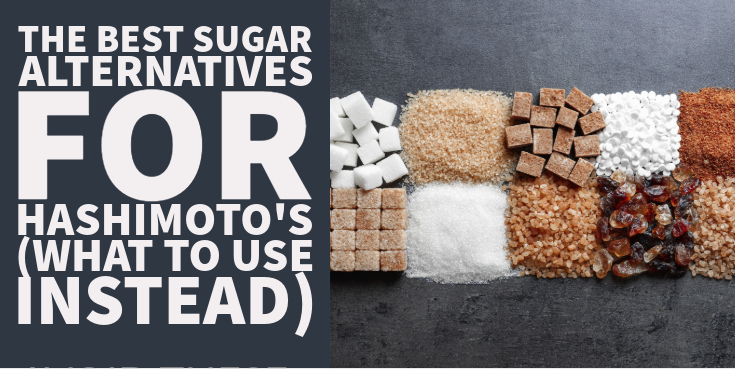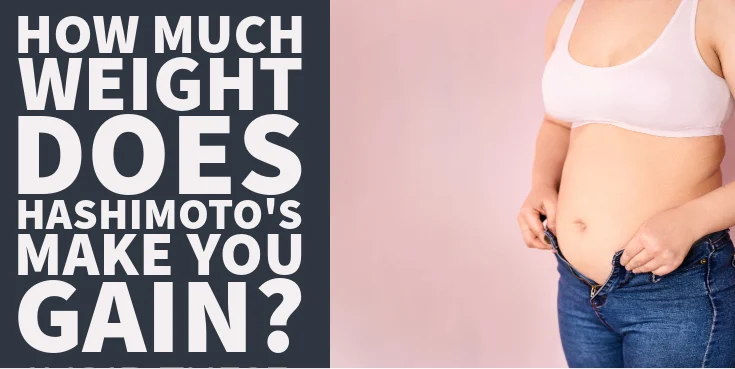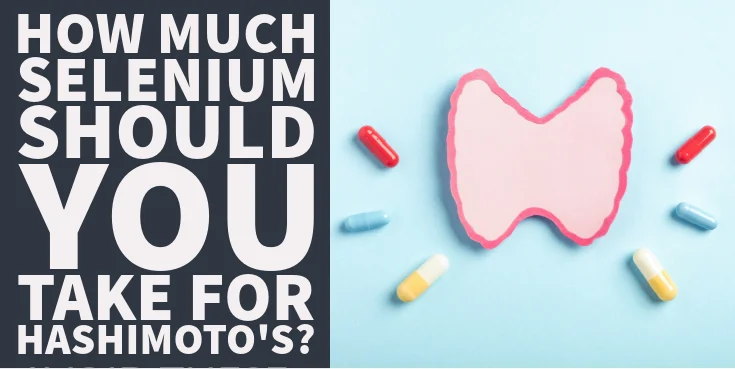One of the best things, and worst things about Hashimoto’s, is that your diet has a powerful impact on how you are feeling.
Unfortunately, this is a double-edged sword.
Good in the sense that you do have some control over how you are feeling.
But bad in the sense that you are accountable for everything that you put into your mouth.
Feeling like eating a donut? You better be careful because that processed sugar and gluten may flare up your immune system.
Want to eat a quick bowl of cereal for breakfast? You should think twice because the dairy in there may increase your TSH.
Think you’ll be safe by just sticking to vegetables? Well, those contain goitrogens which may block iodine uptake.
It may sound confusing, but it’s really not.
As far as all food groups go, these are the most likely to make Hashimoto’s worse:
DOWNLOAD FREE RESOURCES
Foods to Avoid if you Have Thyroid Problems:
I’ve found that these 10 foods cause the most problems for thyroid patients. Learn which foods you should avoid if you have thyroid disease of any type.
The Complete List of Thyroid Lab tests:
The list includes optimal ranges, normal ranges, and the complete list of tests you need to diagnose and manage thyroid disease correctly!
#1. Gluten
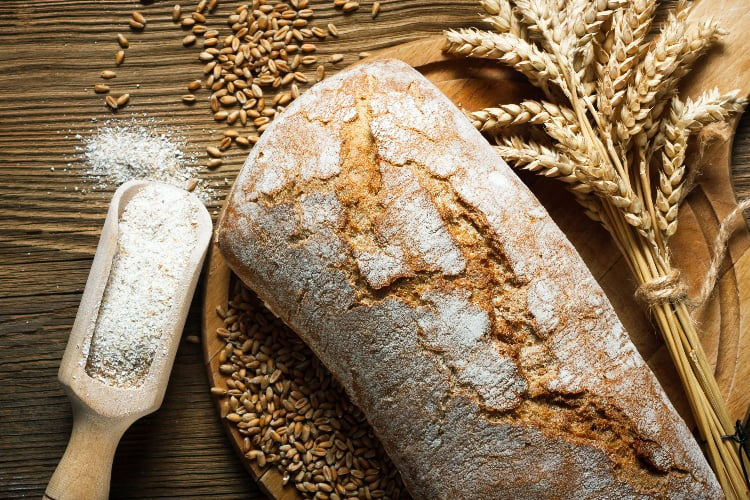
Not everyone with Hashimoto’s will have to avoid this protein found in most grains.
But it is true that many patients with Hashimoto’s experience several benefits when they do.
Here’s what we know about gluten:
- First: There are two types of gluten sensitivity. One is the autoimmune disease known as Celiac disease. And the other is the nonautoimmune disease known as non-celiac gluten sensitivity. Both of these conditions occur more frequently in patients with Hashimoto’s (1) compared to the average population.
- Second: In certain people, even otherwise healthy people (2), gluten may contribute to increased intestinal permeability and inflammation in the gut. So it may not be healthy to consume even if you don’t have a true gluten problem.
- Third: The gluten content of modern wheat has increased due to genetic hybridization (3) and it’s more difficult to digest and process compared to ancient grains.
- Fourth: Many patients with Hashimoto’s report an improvement in their symptoms when going gluten-free and some studies also show the same thing (4).
All that said, let me be clear:
Gluten is not necessarily or automatically something that every patient with Hashimoto’s should avoid.
But it is absolutely worth going gluten-free for a short period of time to see if it works for you.
Even if you don’t truly have a problem with gluten, you will most likely see an improvement in your symptoms simply because removing gluten happens to also remove plenty of other unhealthy foods.
If you are someone who loves to bake then try an ancient grain in place of modern wheat like Kamut or einkorn.
#2. Iodized Salt
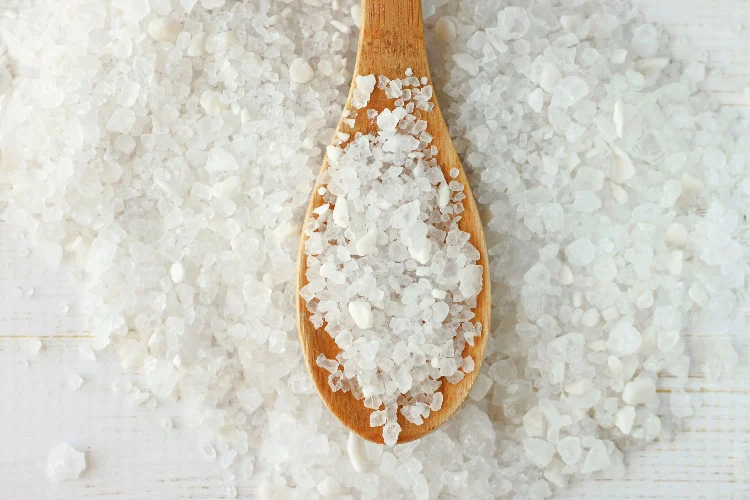
Next on the list is iodized salt!
But I don’t want you to confuse iodized salt with iodine because they are not the same.
Iodized salt is simply salt that has been fortified with iodine.
As a patient with Hashimoto’s, you’ve probably been told that iodine is dangerous so it makes perfect sense that you would want to avoid iodized salt.
But if you are thinking this way then you are thinking about it all wrong.
Iodine is not automatically harmful to patients with Hashimoto’s, but it does have the potential to cause issues (5) if it is used incorrectly.
The reason I recommend avoiding iodized salt is that consuming iodine in this way may be harmful.
But it’s not harmful because of the iodine.
It’s harmful because consuming it this way means you are taking a dose of iodine without additional protective nutrients such as selenium.
We have good reason to believe, at least in some patients, that Hashimoto’s may be triggered due to an imbalance in iodine and selenium.
Iodine promotes the production of thyroid hormones, but it must be balanced with the protective antioxidants created by selenium.
If you take one without the other, you may tip the balance in favor of thyroid gland inflammation instead of thyroid gland protection.
For this reason, it’s always a good idea for patients with Hashimoto’s to consider taking both selenium and iodine together.
Unfortunately, iodized salt only has iodine.
But let me be clear:
Iodine is still required by all human beings, even those with Hashimoto’s and this isn’t something you can get away from.
You just need to make sure that you aren’t taking too much.
#3. Dairy Products

A lot of patients with Hashimoto’s will see an almost immediate improvement in their symptoms after removing dairy from their diet.
Why?
Well, for starters, a huge percentage of people have problems digesting dairy sugars like lactose which is as high as 70% in some studies (6).
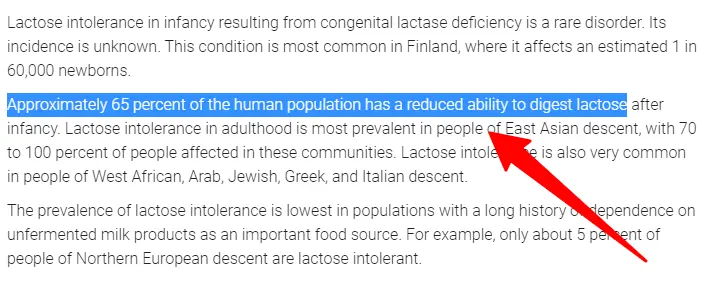
But if you dig a little deeper, you will also find that many people have problems digesting dairy proteins like casein. And this number is as high as 20% of the population.
How does this relate to patients with Hashimoto’s?
It’s not as clear as you might think, but here’s what we know:
Studies seem to suggest that there’s something in milk and dairy products that has a negative impact on the immune system and the thyroid gland, at least for some patients.
Because when they remove dairy from their diet, they see a reduction in thyroid antibodies and a reduction in TSH (7).
The current thought is that, at least for some people, sensitivities to lactose and casein may lead to inflammation in the gut which promotes immune dysfunction.
But there are other potential factors as well, including the fact that dairy proteins have a structure similar to proteins found in the body which may increase the risk of cross-reactivity between the immune system and your own tissues.
On top of this, dairy may contain both animal hormones and antibiotics which may act as endocrine disruptors in humans.
The long story short is that you may find significant improvement in your Hashimoto’s by avoiding dairy products.
If you don’t want to remove all forms of dairy, then consider these options:
- A2 protein milk (8)
- Lactose-free milk (9)
- Hard cheeses (10)
- And feta or goat cheese
These options have less lactose and/or a different composition of casein and tend to be better tolerated.
Much like gluten, the problem with dairy is about how it has been modified and altered over time so your own personal tolerance may vary from someone else.
#4. Soy
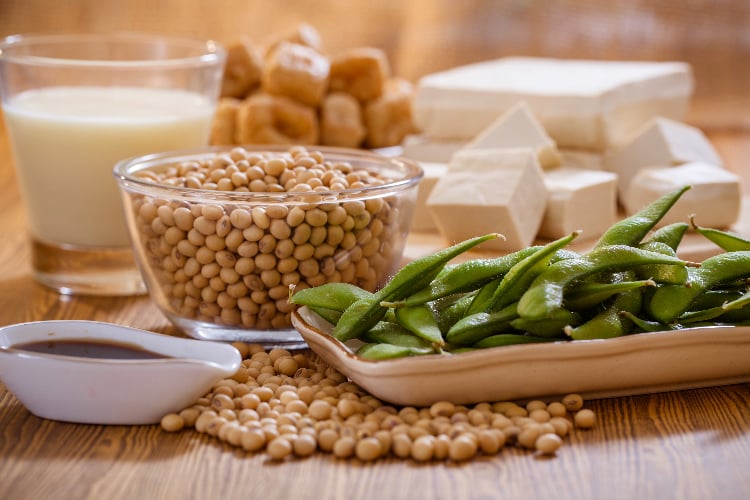
Why is soy a problem?
Well, on one hand, there’s no question that soy contains powerful bioactive compounds in the form of soy isoflavones which have been shown to support bone health and heart health (11) and provide other benefits.
But it’s also just as true that soy may promote problems for patients with Hashimoto’s for three reasons:
#1. It may have an estrogenic effect on the body.
This is good if you are in a low estrogen state like menopause, but not so good if you already have a hard time metabolizing and eliminating estrogen like many thyroid patients.
#2. It can act as a goitrogen thereby blocking iodine uptake into the thyroid gland.
Patients with thyroid problems already have a hard time creating thyroid hormone and this blockage can make that problem even worse.
And #3. Most soy is heavily processed and genetically modified.
Processed foods result in inflammation and contain fewer micronutrients.
The answer to the soy problem is to pay attention to both quantity and quality.
If you want to consume soy then stick a limited amount.
And it’s best if that amount is either fermented or comes as a whole food source that has not been genetically modified.
By the way, if you stick to whole foods like I recommend here then this really isn’t something you have to worry about.
#5. Coffee

Don’t shoot the messenger but coffee is something that you should do your best to avoid if you have Hashimoto’s.
The reason is two-fold:

Coffee, and the caffeine found inside it, may reduce thyroid medication absorption (12) and may have an impact on pituitary function.
One case study showed that a patient taking levothyroxine saw a huge drop in her TSH when she stopped taking her medication with coffee.
And in this instance, she was only taking her medication with a small sip.
But beyond this, caffeine also has a stimulating effect on cortisol and other adrenal hormones (like adrenaline) which is why so many people see a boost to their energy when they take it.
The problem is that this is not a natural source of energy and it may put strain on an already strained adrenal system leading to more fatigue down the road.
Some people will suggest that low doses of coffee and caffeine may have a beneficial effect on thyroid function, which may be true in certain populations.
But I’ve found that people often blow through this therapeutic threshold thereby causing more harm than good.
If you are a coffee lover then my recommendation is to stick to decaf and keep your total caffeine intake somewhere between 25 to 50 mg per day.
But I will tell you from personal experience that many thyroid patients report having more energy, better sleep, and less stress after stopping coffee.
#6. Alcohol

You can and should think of alcohol as a poison to your thyroid gland (13).
It not only has the ability to poison your cells, it also has a direct negative impact on your pituitary gland.
It also damages liver cells which are vital for thyroid hormone processing.
In fact, your liver is the location where the majority of T4 in your body is converted into T3.
In other words, the more damage to your liver, the less active your thyroid will be.
There’s a lot less nuance here than there is for some of the other food groups we’ve discussed and it’s hard to make a case for any alcohol consumption.
For this reason, just avoid it 100%.
Your thyroid will thank you as well as the rest of your body.
#7. Processed Foods

This should be another obvious one, but it’s missed by many thyroid patients.
Why?
Because research indicates that the average person has a hard time knowing what exactly processed food is.
Just so you aren’t confused, here’s the simple definition:
Ultra-processed foods are foods that you would be unable to make in your own home.
That’s it.
These foods are laden with chemicals, preservatives, sweeteners, flavor additives, and other artificial ingredients which make them less like a food and more like a chemical.
And the consumption of them has disastrous effects on both your overall health as well as your thyroid.
Reducing your consumption of these foods can naturally improve your thyroid, reduce inflammation, help you lose weight, and normalize food cravings.
If you aren’t avoiding ultra-processed foods, now is the time.
#8. Refined & Processed Sugar
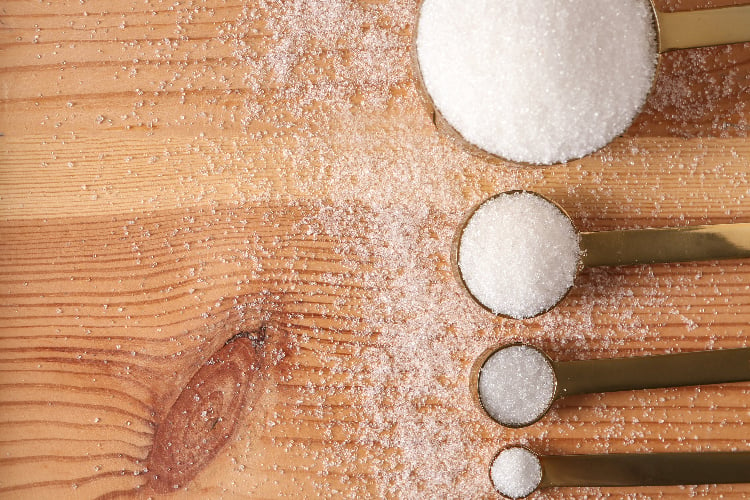
But let me be clear here and draw a distinction between processed sugar and whole-food sources of sugar.
One is bad, the processed version.
And one is perfectly fine, the whole food version.
Processed and refined sugar that is added to processed foods and beverages can increase your already increased risk of diabetes and insulin resistance if you have a thyroid problem.
But whole-food sources of carbohydrates such as fruits and 100% fruit juice are not only perfectly safe to consume but are even healthy for your thyroid gland.
The processed types of sugar you want to avoid include:
- Table sugar
- Brown sugar
- Powdered sugar
- Corn syrup
- High fructose corn syrup
And the whole-food sources you shouldn’t be afraid of include:
- Honey
- Date syrup
- Maple syrup
- Agave syrup
- Fruits
- And 100% fruit juice
You can consume up to 100 grams of these foods each day without worrying about their risk on blood sugar or weight gain (14).
But the same is not true of the processed sources of sugar. Those will cause problems.
#9. Industrial Seed Oils
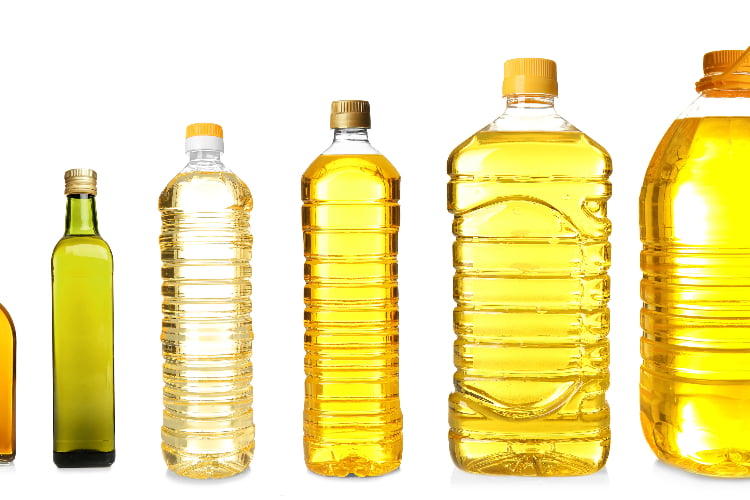
Seed oils and their impact on health is a hotly debated topic.
Depending on where you look, and who funds the study, you’ll hear that they are either a heart-healthy superfood or an inflammation-promoting junk food.
If you have a thyroid problem, I would recommend you avoid these oils like the plague.
Here’s why:
- These oils are heavily processed in ways that make them impossible to create in your own home. If other ultra-processed foods are unhealthy and should be avoided, why are these somehow exempt?
- Seed oils have a less stable structure compared to other fats which means they are more prone to oxidation and have a shorter shelf life.
- When heated and reheated, they can create toxic byproducts, like aldehydes, that have been shown to cause harm to the body.
- They contain a high amount of omega-6 fatty acids which may contribute to inflammation.
Because there are other whole food sources of fats that are readily available, why even take the risk of consuming these fats?
It just doesn’t make sense.
It’s been my experience that thyroid patients often see a huge improvement in their health when they eliminate these oils.
But if you want to keep them in your diet, for whatever reason, make sure to limit your exposure to them to no more than 1 tablespoon per day.
If you aren’t sure what a seed oil is, here’s a list:
- Soybean oil
- Peanut oil
- Corn oil
- Safflower oil
- Wheat-germ oil
- Canola oil
- Sunflower oil
- Cottonseed oil
- Grapeseed oil
- Rice bran oil
You’ll find them in pretty much everything including all processed foods and most foods found in restaurants.
In my opinion, it’s easier to remember the list of fats and cooking oils that you should use instead.
Here’s that list:
- Extra virgin olive oil
- Coconut oil
- Butter from grass-fed cows
#10. Certain Vegetables (If Eaten In Large Amounts)
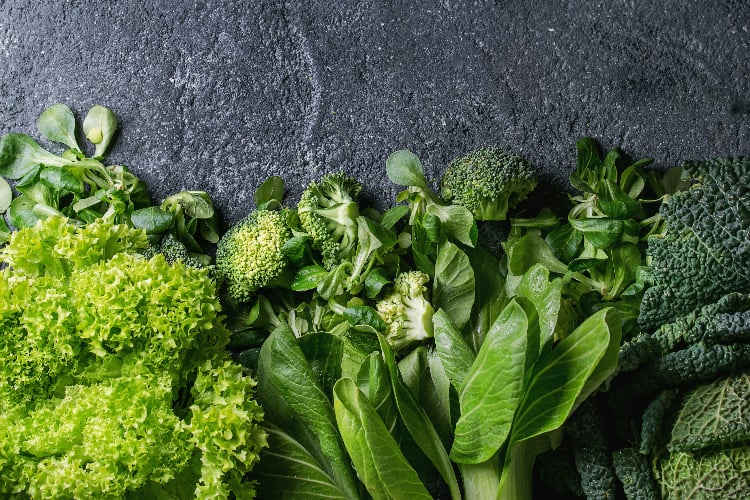
This is sort of a sneaky addition, but it’s worth mentioning because patients with Hashimoto’s often get confused by it.
Some people will say that vegetables should be avoided if you have a thyroid problem, but is this really true?
Not at all.
Vegetables are amazing for your thyroid health and you should be eating 4-5 servings of them each and every day.
But what is true is that certain vegetables contain goitrogenic compounds which may serve to block iodine uptake into the thyroid gland.
Yes, this is a slight potential negative to their consumption, but their overall benefits easily outweigh this.
In addition, you can easily negate this effect by doing two simple things:
First, boil or steam your veggies before you consume them.
And second, increase your iodine intake.
Properly preparing your veggies can reduce goitrogen content by up to 50% and taking more iodine means you can outcompete them even if they make it through.
So, no, don’t avoid your veggies if you have Hashimoto’s!
Final Thoughts
You can do a tremendous amount of good for your thyroid by avoiding the wrong foods and eating the right foods.
But your diet shouldn’t be the only tool you use.
In addition to diet, there are some supplements that have been proven in controlled trials to lower thyroid antibodies,
And if you want to see a list of the most effective, make sure to check out this article next.
Scientific References
#1. https://pmc.ncbi.nlm.nih.gov/articles/PMC9312543/
#2. https://pmc.ncbi.nlm.nih.gov/articles/PMC11053402/
#3. https://pmc.ncbi.nlm.nih.gov/articles/PMC6769531/
#4. https://pubmed.ncbi.nlm.nih.gov/37554764/
#5. https://www.ncbi.nlm.nih.gov/pmc/articles/PMC4192807/
#6. https://ghr.nlm.nih.gov/condition/lactose-intolerance
#7. https://pubmed.ncbi.nlm.nih.gov/24078411/
#8. https://pmc.ncbi.nlm.nih.gov/articles/PMC7766938/
#9. https://pmc.ncbi.nlm.nih.gov/articles/PMC7318541/
#10. https://pmc.ncbi.nlm.nih.gov/articles/PMC4586535/
#11. https://pmc.ncbi.nlm.nih.gov/articles/PMC6683102/
#12. https://pubmed.ncbi.nlm.nih.gov/18341376/
#13. https://pmc.ncbi.nlm.nih.gov/articles/PMC3743356/
#14. https://pubmed.ncbi.nlm.nih.gov/26091353/
